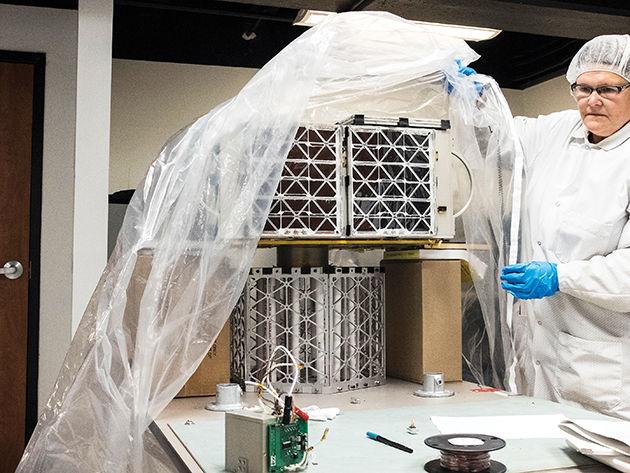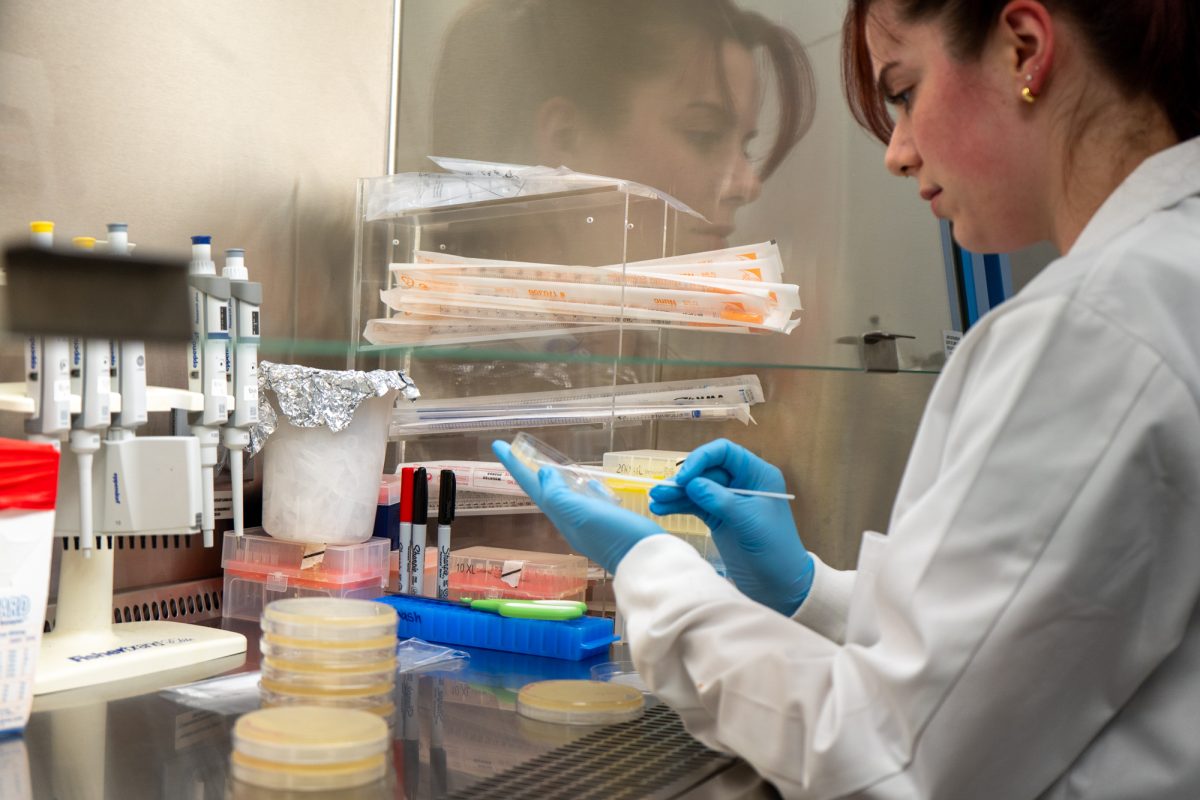A piece of Aggieland will launch into space Thursday.
The AggieSat4, a student-built satellite, will be carried aboard an AtlasV rocket on its journey to the International Space Station.
AggieSat4 is the most recent project of AggieSat Lab, a student-run program that designs, builds and operates small spacecraft. The satellite is part of a joint project with the University of Texas, whose Bevo-2 spacecraft will release from the Aggie satellite once in orbit.
Helen Reed, aerospace professor and director of AggieSat Lab, said the launch is the second of a four-phase project titled “Lonestar,” which aims to demonstrate autonomous rendezvous and docking capabilities of small satellites.
Adelyn Destain, aerospace junior and project manager, said AggieSat4’s main objective is to separate the two satellites while tracking their relative locations.
“We are going to separate and exchange positional data on the position of the two satellites so we can calculate a relative navigational solution between them,” Destain said. “So think of it as a reverse docking maneuver where instead of slowly coming together we are slowly drifting apart while tracking each other.”
Destain said work on AggieSat4 dates back to fall 2010.
“We started with the design of the satellite — that went on for a couple of years,” Destain said. “After that, we ordered parts and started putting together the structure, then we shouldered in with the components we had chosen for the various subsystems, all the while creating the base foundation of software and working our way toward higher level software and design that’s involved with the control of the satellite.”
Reed said AggieSat4 passed all necessary tests performed by NASA, which included checks to insure the astronauts aboard the ISS will be able to assemble and release the satellites safely. Reed said the satellites will be stored onboard the ISS until it is released through an airlock into orbit.
Mitchel McDonald, aerospace senior and attitude determination and control system lead, said he hopes AggieSat Lab’s work will inspire other universities to follow suit.
“There have been increasing opportunities for small sats within universities,” McDonald said. “So, what we are doing is a stepping stone for other universities to partake in, to build on what we have come up with.”
Reed said AggieSat Lab’s work is at the forefront of the space industry’s transition toward smaller satellites.
“Texas A&M University and University of Texas work together in trying to solve the real world problems of enabling small spacecraft, which are really the way of the future,” Reed said. “Having them be able to work together, to dock and undock and so forth, the applications for that are just going to be limitless.”
Reed said she and eight students on the team will witness the launch of Atlas V from Cape Canaveral in Florida.
“I’m very excited to go to the launch,” Reed said. “Every launch I have been to of one of the satellites that have been created by one of my students has been very emotional experience for me and I am very much looking forward to this one on Thursday.”
Reed said she is pleased with how the project has progressed.
“No matter what happens with the launch this project has already been a success,” Reed said. “Look at all the students that have come through the program, actually being able to work on a piece of their dream. It’s been a huge success.”
satellites so we can calculate a relative navigational solution between them,” Destain said. “So think of it as a reverse-docking maneuver, where instead of slowly coming together we are slowly drifting apart while tracking each other.”
Destain said work on AggieSat4 dates back to fall 2010.
“We started with the design of the satellite — that went on for a couple of years,” Destain said. “After that, we ordered parts and started putting together the structure. Then we shouldered in with the components we had chosen for the various subsystems, all the while creating the base foundation of software and working our way toward higher level software and design that’s involved with the control of the satellite.”
Reed said AggieSat4 passed all necessary tests performed by NASA, which included checks to ensure the astronauts aboard the ISS will be able to assemble and release the satellites safely. Reed said the satellites will be stored onboard the ISS until it is released through an airlock into orbit.
Mitchel McDonald, aerospace senior and attitude determination and control system lead, said he hopes AggieSat Lab’s work will inspire other universities to follow suit.
“There have been increasing opportunities for small sats within universities,” McDonald said. “So, what we are doing is a stepping stone for other universities to partake in, to build on what we have come up with.”
Reed said AggieSat Lab’s work is at the forefront of the space industry’s transition toward smaller satellites.
“Texas A&M University and University of Texas work together in trying to solve the real world problems of enabling small spacecraft, which are really the way of the future,” Reed said. “Having them be able to work together, to dock and undock and so forth, the applications for that are just going to be limitless.”
Reed said she and eight students on the team will witness the launch of the Atlas V from Cape Canaveral in Florida.
“I’m very excited to go to the launch,” Reed said. “Every launch I have been to of one of the satellites that have been created by one of my students has been very emotional experience for me and I am very much looking forward to this one on Thursday.”
Reed said she is pleased with how the project has progressed.
“No matter what happens with the launch this project has already been a success,” Reed said. “Look at all the students that have come through the program, actually being able to work on a piece of their dream. It’s been a huge success.”
Ready for launch
December 1, 2015
Photo by File
AggieSat4 will launch on the Atlas V rocket Thursday to the International Space Station.
0
Donate to The Battalion
Your donation will support the student journalists of Texas A&M University - College Station. Your contribution will allow us to purchase equipment and cover our annual website hosting costs.
More to Discover








